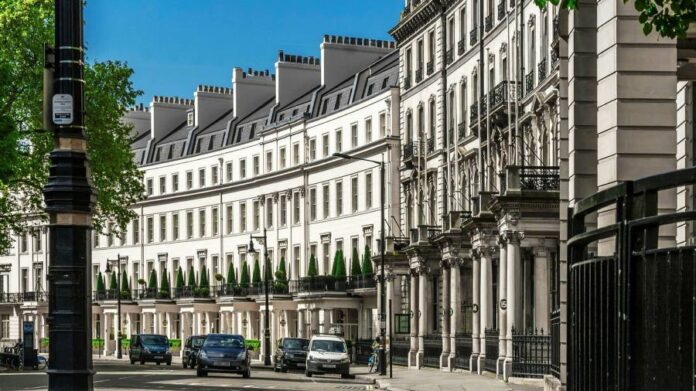Property sector updates
Sign up to myFT Daily Digest to be the first to know about Property sector news.
More UK homes were sold out of the glare of the open market in the first three months of this year than in any quarter since 2007, as the property boom and a shortage of stock gave sellers the confidence to limit the pool of potential buyers for their homes.
Some 37,070 homes changed hands “off-market” in the first quarter of this year, compared with 20,830 in the same period in 2019, according to research by estate agent Hamptons International. The latest quarterly figure was the highest since it began collecting the data 14 years ago.
In a private sale, a vendor’s estate agent may hand-pick a suitable buyer from their closely guarded records or contact a buying agent to identify an interested party.
Aneisha Beveridge, research director at Hamptons International, said sellers may go under the radar to try out an above-market price without worrying about the impact of a failure to sell. “Stock levels are so short at the moment, there are few properties to buy and there’s some uncertainty over what homes are really worth. A lot of people are testing the market to see what happens.”
London is a key market for these discreet sales. One in five sales in the capital were off-market in the first quarter, up from 11 per cent in 2019, Hamptons said.
This boost was partly explained by larger numbers of cheaper homes sold away from the open market in the capital. The average price achieved off-market in the first quarter of this year was £1.25m, down from £1.35m last year. For the first time, more than half of these were in outer London, Hamptons said.
The data also underlined the strength of demand among buyers, with 31 per cent of off-market sellers achieving over the asking price — compared with an overall average of 25 per cent.
The UK housing market has taken off in the pandemic, as homeworking fuelled demand for lockdown-friendly homes and buyers rushed to take advantage of a stamp duty holiday on the first £500,000 of a residential purchase. The number of residential transactions in March 2021 was double that in March last year and one-third higher than February 2021, according to HM Revenue & Customs data.
There are several reasons sellers may forgo the chance to make more money on the open market. At the top end, wealthy owners of the most expensive homes value the security and confidentiality of doing a deal behind closed doors.
Roarie Scarisbrick, partner at buying agency Property Vision, said: “Sellers at that level don’t really want others to know their business, say, if they’re getting divorced or they’ve fallen on hard times. It’s better for them, neater and easier than having the full double-page spread in Country Life magazine.”
The pandemic also brought fears over a succession of interested buyers traipsing through homes, particularly when worries surfaced over new Covid variants in January.
If vendors use the private market to test a bullish price and it fails to sell, many will then move to the open market for a conventional sale at a lower price. Hamptons said that while 20 per cent of London sales in the first quarter of 2021 were fully off-market, a further 12 per cent of homes were launched off-market before subsequently being more widely advertised and sold.
Henry Pryor, an independent buying agent, said the disadvantage for vendors who succeed in making an off-market sale was never knowing if they could have got a higher price on the public market. But he said many preferred the certainty and “sobriety” of a private deal to the fraught atmosphere of a highly competitive open market.
“If you’re dealing with expensive properties, having a bit of time for everyone to do their due diligence is useful, particularly if you can do it away from the public glare, which might add complications like another buyer — and therefore potential gazumping,” he said.
Beveridge said that where desirable properties were being advertised online, they were generating so much interest that agents were in any case having to vet those they would take to a viewing.
Pryor related the experience of a client who recently went to see a property in Gloucester. “They were one of 20 viewers and the agent had already turned away 30 people who’d wanted to see it. There were 10 buyers at the ‘best and final offer’ stage. You could imagine someone who wasn’t successful at that stage coming back and making another bid after the deadline.”
Buyers willing to consider private sales can significantly widen their choices, said Scarisbrick. But they must go “off market” with their eyes open. “It’s a great place to go shopping, but not bargain hunting. You’re trying to root out rare and special items for which you are going to have to pay a price. If you don’t like that price, there’s very little scope for negotiation.”
Credit: Source link









